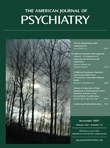The Serotonin Transporter Genotype and Social Support and Moderation of Posttraumatic Stress Disorder and Depression in Hurricane-Exposed Adults
Abstract
Objective: Disasters are associated with increased risk of posttraumatic stress disorder (PTSD) and major depression, but no study, to the authors’ knowledge, has determined whether genotype interacts with disaster exposure and social support to moderate risk of these phenotypes. The authors tested the hypothesis that a polymorphism in the serotonin transporter gene (locus, SLC6A4 ; variant, serotonin 5-HTTLPR) moderates risk of posthurricane PTSD and major depression given high hurricane exposure and low social support. Method: The authors interviewed a household probability sample of adults 6–9 months after the 2004 hurricanes about hurricane exposure, social support, and posthurricane PTSD and major depression. DNA was collected from a subset of participants. Participants were 589 adults ages 18 and older from 38 Florida counties who provided valid DNA samples. Outcome measures were DSM-IV diagnoses of posthurricane PTSD and major depression derived from structured interviews. Results: The low-expression variant of the 5-HTTLPR polymorphism increased risk of posthurricane PTSD and major depression but only under the conditions of high hurricane exposure and low social support after adjustment for sex, ancestry (as determined by Bayesian clustering of genotypes), and age. Similar effects were found for major depression. High-risk individuals (high hurricane exposure, the low-expression 5-HTTLPR variant, low social support) were at 4.5 times the risk of developing PTSD and major depression of low-risk individuals. Conclusions: The low-expression variant of the 5-HTTLPR polymorphism modifies risk of postdisaster PTSD and major depression under conditions of high hurricane exposure and low social support, confirming and extending previous research.



